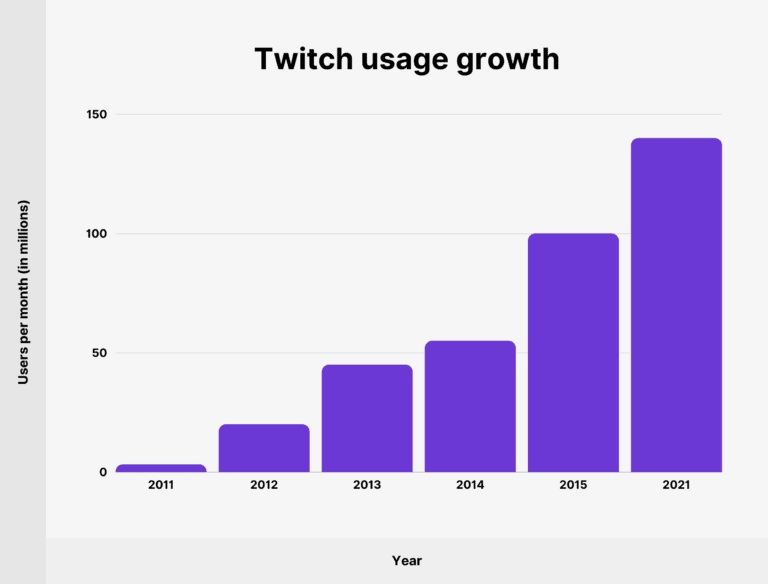Put your growth on autopilot
GrowSurf is modern referral program software that helps product and marketing teams launch an in-product customer referral program in days, not weeks. Start your free trial today.
Founded in 2011 by Justin Kan, Twitch has become a world-leader in online streaming and esports. Used by heavy-hitting content creators globally, Twitch focuses on live game streaming, “in real life” streams, and music broadcasts. Twitch is actually a spin-off of Justin’s original live streaming platform, justin.tv.
Twitch reached 3.2 million monthly active users (MAU) in only a year. With growth sky-rocketing, Twitch quickly gained the attention of marketplace giant Amazon. In August of 2014 Amazon acquired the live streaming platform for $970 million. After becoming a subsidiary of Amazon, the platform grew to 140 million MAU. Fast forward to 2020, Twitch is averaging 30 million average daily visitors consuming a staggering 1 trillion minutes of live streams. Cream will always rise to the top but how fast? The growth and velocity Twitch has established in only 10 years make the company a great case study for entrepreneurs, marketers and startups looking to expand their customer base.

Image source: Backlinko
Let’s take a closer look at 4 reasons Twitch grew from a humble San Francisco startup in 2011, to live stream leader owning 67.6% of the market share in 2021.
Twitch is streamed live, in real time. This keeps them ahead of their competitors, but they weren't the first to do so. In 2012, YouTube collaborated with RedBull to display the largest livestream to date with Felix Baumgartner's record-breaking stratospheric skydive from 128,000 feet. The event drew over 8 million concurrent viewers, showcasing the massive audience potential for live streaming.
This historical event was a primary moment furthering the all-ready increasing popularity of live stream events. In 2016, the live video streaming market was worth $30 billion, and is expected to be worth nearly $185 billion by 2027. Thanks, YouTube.

Image source: Red Bull
Twitch got its early start in live gaming, being one of the few platforms offering exclusively real-time streaming content. When streaming live, viewers can interact directly with streamers and become part of the action. Esports and gaming have consistently been the most popular forms of live stream content consumed on Twitch. As this niche rapidly gained popularity, other major platforms like YouTube, Twitter, and Facebook began taking gaming and live streaming much more seriously to compete with Twitch's first-mover advantage.
Today, Twitch, YouTube, and Facebook combined are racking up billions of live stream views each month. According to StreamLabs data, Twitch remains the market leader with over 2.1 billion hours watched in Q4 2022, followed by YouTube Gaming at 1.1 billion hours and Facebook Gaming at 346 million hours.
The global COVID-19 pandemic further accelerated live streaming growth as communities adapted to "The New Normal" of virtual interaction. From March to May 2020 alone, Twitch's total hours watched surged by 67%. Like Zoom, the pandemic significantly increased demand for live streaming content and platforms enabling virtual connection.
Sign up for a free trial of GrowSurf to lower your customer acquisition costs, increase customer loyalty, and save gobs of time.

Second only to the NFL, esports are the most watched form of competitive gaming in America, reaching Super Bowl-level popularity. With currently over 1 billion esports fans worldwide, it's no surprise that there has been a meteoric rise in professional tournaments and competitions. Offering both online and offline events with substantial prize pools, esports tournaments have become major draws for viewers and pro gamers alike. What were once niche competitions taking place solely on computer screens now fill massive arenas and stadiums, while simultaneously live streaming to millions on Twitch.
TwitchCon is Twitch's rapidly growing annual convention celebrating all aspects of gaming and live streaming culture. In 2022, the event drew over 170,000 attendees over three days, with fans flocking to meet their favorite streamers, attend esports tournaments, experience immersive activations, and be part of this booming global community.

One of Twitch's standout features driving its popularity is the live chat functionality. Allowing real-time interaction between viewers and streamers, often anonymously, gives users a sense of participation and influence over the content. This level of engagement helps build loyal, invested communities around popular streamers and channels.
In 2015, Old Spice launched an innovative marketing campaign called "Old Spice Nature Adventure" on Twitch. This interactive experience, where viewers could influence an actor's actions in a virtual wilderness, achieved a staggering 2.6 million total views and 88,000 unique requests per hour, showcasing the engagement potential of Twitch's live chat.
In recent years, Twitch has expanded its reach beyond just gaming content. Most notably, the platform has seen massive growth in its 'Just Chatting' category, which allows streamers and viewers to engage through open-ended live discussions and broadcasts without any gaming involved. This has opened the door for new genres like 'social eating' or mukbang streams, where people livestream themselves eating large quantities of food.
The mukbang trend originated in South Korea on platforms like AfreecaTV before gaining major traction on Twitch's 'Food & Drink' category. While it may seem bizarre to watch people eating excessively, the format taps into feelings of community and connectedness that help drive its popularity.
While mukbang streams featuring excessive eating may seem gluttonous or bizarre on the surface, this form of "social eating" content has seen incredible traction and popularity on Twitch. One theory is that mukbang streams help suppress feelings of loneliness by fostering a sense of virtual community and connection. You can witness the evolution of this emotional eating phenomenon on Twitch's Food & Drink category.

Image source: Thrillist
Another example of Twitch's expansion beyond gaming is its 'Creative' category, which invites a broad range of artists, musicians, designers, and other creatives to express themselves through live broadcasts. To promote this new category, Twitch even streamed an all-episode marathon of iconic painter Bob Ross's 'The Joy of Painting' series, which drew an impressive 5.6 million viewers over the course of the stream.
Closer to its gaming roots, Twitch has also partnered with major sports teams and leagues. For example, Amazon signed a deal for Twitch to livestream English Premier League soccer matches in the UK, tapping into the platform's passionate fandom. Many European soccer clubs have also started using Twitch to offer fans an intimate, all-access experience by livestreaming training sessions, press conferences, and behind-the-scenes content.
Twitch has maintained its forward momentum and market dominance by continually adapting its platform to meet the evolving needs and interests of its user base. From its gaming roots to esports tournaments, creative broadcasts, sports partnerships, and niche subcultures like mukbang, Twitch has proven its ability to attract diverse audiences across a wide range of verticals. By embracing this expansive content strategy, Twitch now boasts over 31 million daily active users tuning in from around the world.
Live streaming has seen incredible rates of growth over the last decade, mainly thanks to Twitch���s platform. People began livestreaming popular games such as World of Warcraft.
Sign up for a free trial of GrowSurf to lower your customer acquisition costs, increase customer loyalty, and save gobs of time.


GrowSurf is modern referral program software that helps product and marketing teams launch an in-product customer referral program in days, not weeks. Start your free trial today.
The easiest way to make a product go viral? Build it with a viral design. Learn the 6 best ways to incorporate virality into product design.
World of Warcraft (WoW)'s referral program, Recruit a Friend has been a primary customer acquisition channel for the gaming titan. Here's how WoW referrals work
Looking for referral program inspiration? In this post, we've compiled 41 referral program examples, with screenshots of their websites, emails, and user flows.